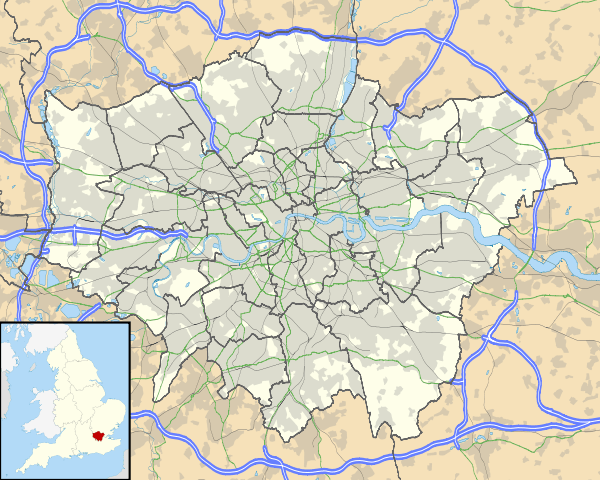Stroud Green
| Stroud Green | |
| Holy Trinity, Stroud Green |
|
 Stroud Green |
|
| Population | 11,758 (2011 census.Ward)[1] |
|---|---|
| OS grid reference | TQ311881 |
| London borough | Haringey |
| Ceremonial county | Greater London |
| Region | London |
| Country | England |
| Sovereign state | United Kingdom |
| Post town | LONDON |
| Postcode district | N4 |
| Dialling code | 020 |
| Police | Metropolitan |
| Fire | London |
| Ambulance | London |
| EU Parliament | London |
| UK Parliament | Hornsey and Wood Green & Tottenham |
| London Assembly | Enfield and Haringey |
Coordinates: 51°34′36″N 0°06′34″W / 51.57653°N 0.10950°W
Stroud Green is the name of a suburb (and administrative ward) located adjacent to Finsbury Park in north London, England. Stroud Green ward is within the London Borough of Haringey. On its south-western side the Stroud Green Road forms part of the boundary with the London Borough of Islington. Thus, the adjacent areas of Islington are sometimes referred to as Stroud Green.[2]
Stroud Green Road is the main local hub and shopping area for residents. At its eastern end it intersects Seven Sisters Road and Blackstock Road at a major crossroads. Stroud Green Road is a populous thoroughfare linking the area of Crouch Hill with the major north London transport interchange of Finsbury Park station.
History
Toponymy
In 1407 the area was called Strode, which is formed from the Old English 'stōd' and means 'marshy ground covered with brushwood'. It is recorded as Stowde Grene in 1546, the 'grene' suffix is Middle English and means 'village green'.[3]
Stroud Green Road
Stroud Green Road has an array of shops stretching the length of the road, including one Tesco Metro supermarket and two Sainsbury's supermarkets. Most of the shops, however, are independent, with Time Out describing the range of shops as "impressive" and giving a sense of "how international the district is".[4] The wide selection of restaurants on Stroud Green Road range from the standard Indian and Chinese to the more exotic Mauritian and Caribbean. The street is home to the original branch of Italian-owned North London pizza restaurant chain La Porchetta, as well as several bars and pubs. One unusual feature is perhaps the large cluster of wig shops at the Finsbury Park end of the road, where there is also a bowling alley and a cycle park, opposite the station.
Stroud Green Road can become busy after matches at Arsenal FC's Emirates Stadium or music concerts in Finsbury Park, both nearby. The Finsbury Park end of the road, like the rest of the surroundings of the station, is markedly more run-down, blighted environmentally by parallel low railway bridges bringing the mass of overground lines into Finsbury Park station. An assortment of low-rise commercial buildings near to the station has been replaced with a new student halls of residence as part of the John Jones site redevelopment.
The famous folk record label, Topic Records, used to reside at 48-50 Stroud Green Road and many celebrated folk LPs were recorded there. The label has now moved to Uppingham in Rutland.
Transport
Stroud Green Road runs north west from the transport hub of Finsbury Park station, and stops just 150 yards south east of Crouch Hill railway station on the Gospel Oak to Barking line. London bus routes W3, W7, and 210 run the length of Stroud Green Road, terminating at Finsbury Park. The low railway bridge at Finsbury Park prevents bus routes running directly from areas north of Finsbury Park such as Stroud Green Road directly into central London.
Stroud Green railway station closed in 1954. It was on the Finsbury Park to Edgware line, and along with nearby Crouch End railway station had been planned to be added to the Northern line of London Underground, but World War II intervened.
External links
References
- ↑ "Haringey Ward population 2011". Neighbourhood Statistics. Office for National Statistics. Retrieved 22 October 2016.
- ↑ See for example the catchment area covered by the discussion forum StroudGreen.org
- ↑ Mills, D. (2000). Oxford Dictionary of London Place Names. Oxford.
- ↑ Lamont T. (ed): "London for Londoners", pp. 86-88. Time Out, 2006
